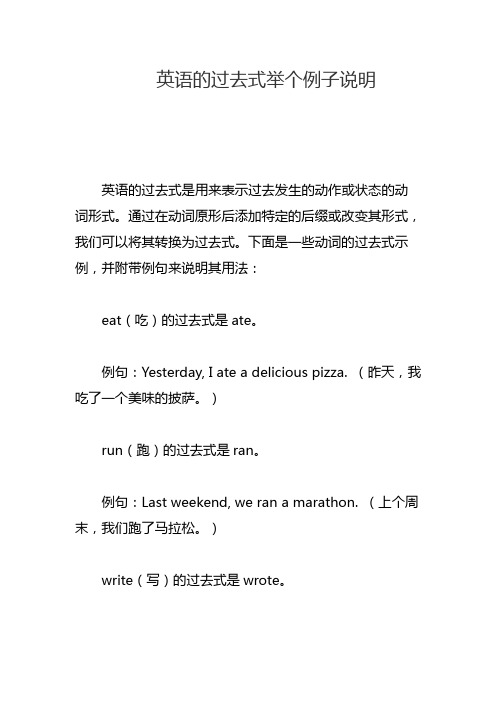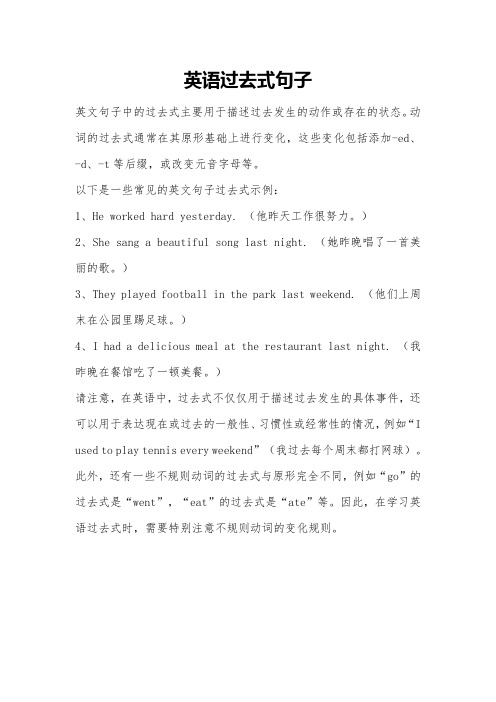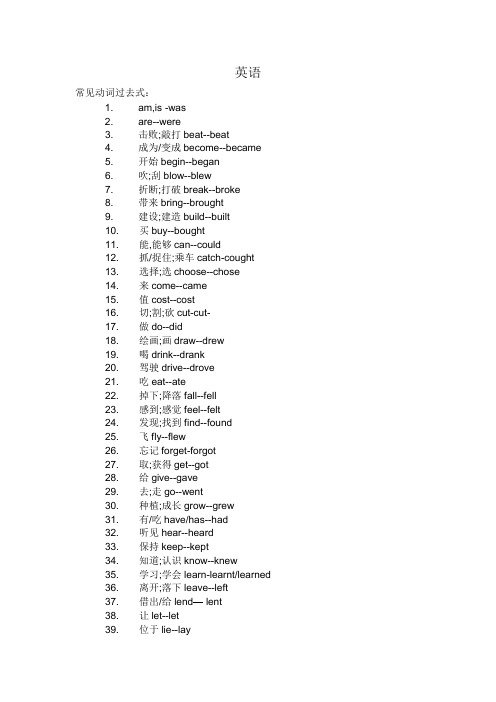英语过去式句子大全.
英语过去式句子大全.

英语过去式句子大全.过去式的概念、动词的过去式变形、句子的过去式变形和不规则动词列表i一般过去时态定义:表示过去某时发生的动作或存在的状态。
结构:“主语+动词的过去式”用法:1.表示过去某个时间发生的动作或存在的状态。
he was here yesterday.i got up at seven yesterday morning. my mother was at work yesterday afternoon. did you have a good time last summer?2.表示过去经常或反复发生的动作。
my mother often went to work by taxi last year. when i was a student, i often listened to music.3. 常与一般过去时态连用的时间有:一般过去式的用法:一般过去式表示过去的动作和状态,通常一般过去式带有表示动作时间状语的词,词组或从句,如yesterday, the day before last, last week, two days ago 等,上下文清楚时可以不带时间状语。
i worked in that factory last year. 去年我在那一家工厂工作。
i met him yesterday. 昨天我碰见了他。
i went to the tian long mountain yesterday. 昨天我们去了天龙山。
一般过去式构成:表示一般过去式的动词通常用动词的过去式形式来表示,而动词的过去式是在动词原形的基础上变化的。
动词的过去式可分为规则动词和不规则动词。
4. 一般过去时的标志词:last year; last nightyesterday (+morning, afternoon, evening) in +过去时间词: in 1998…依上下文或句子。
英语的过去式举个例子说明

英语的过去式举个例子说明英语的过去式是用来表示过去发生的动作或状态的动词形式。
通过在动词原形后添加特定的后缀或改变其形式,我们可以将其转换为过去式。
下面是一些动词的过去式示例,并附带例句来说明其用法:eat(吃)的过去式是ate。
例句:Yesterday, I ate a delicious pizza. (昨天,我吃了一个美味的披萨。
)run(跑)的过去式是ran。
例句:Last weekend, we ran a marathon. (上个周末,我们跑了马拉松。
)write(写)的过去式是wrote。
例句:He wrote a letter to his friend last night. (他昨晚给他的朋友写了一封信。
)sing(唱歌)的过去式是sang。
例句:She sang beautifully at the concert. (她在音乐会上唱得非常好。
)play(玩,打)的过去式是played。
例句:We played football in the park yesterday afternoon. (我们昨天下午在公园里踢足球。
)swim(游泳)的过去式是swam。
例句:They swam in the lake last summer. (去年夏天,他们在湖里游泳。
)go(去)的过去式是went。
例句:She went to the market to buy some fruits. (她去市场买了一些水果。
)see(看见)的过去式是saw。
例句:I saw a movie with my friends last night. (我昨晚和朋友们看了一部电影。
)这些示例展示了如何将动词转换为过去式,并在句子中使用它们来描述过去的事件或动作。
通过学习和练习,您将能够掌握更多的过去式形式,并在实际交流中运用自如。
英语过去式句子

英语过去式句子
英文句子中的过去式主要用于描述过去发生的动作或存在的状态。
动词的过去式通常在其原形基础上进行变化,这些变化包括添加-ed、-d、-t等后缀,或改变元音字母等。
以下是一些常见的英文句子过去式示例:
1、He worked hard yesterday. (他昨天工作很努力。
)
2、She sang a beautiful song last night. (她昨晚唱了一首美丽的歌。
)
3、They played football in the park last weekend. (他们上周末在公园里踢足球。
)
4、I had a delicious meal at the restaurant last night. (我昨晚在餐馆吃了一顿美餐。
)
请注意,在英语中,过去式不仅仅用于描述过去发生的具体事件,还可以用于表达现在或过去的一般性、习惯性或经常性的情况,例如“I used to play tennis every weekend”(我过去每个周末都打网球)。
此外,还有一些不规则动词的过去式与原形完全不同,例如“go”的过去式是“went”,“eat”的过去式是“ate”等。
因此,在学习英语过去式时,需要特别注意不规则动词的变化规则。
四年级英语动词过去式练习30道

四年级英语动词过去式练习30道1. I ______ (go) to the park yesterday. 答案:went 解析:go 的过去式是went,yesterday 是过去的时间,要用过去式。
2. She ______ (eat) an apple last night. 答案:ate 解析:eat 的过去式是ate,last night 表示过去。
3. They ______ (play) football on Sunday. 答案:played 解析:play 的过去式是played,描述过去发生的动作。
4. He ______ (watch) TV yesterday evening. 答案:watched 解析:watch 的过去式是watched,yesterday evening 是过去时间。
5. We ______ (see) a movie last week. 答案:saw 解析:see 的过去式是saw,last week 表明过去的时间。
6. I ______ (play) football with my friends yesterday. 答案:played 解析:yesterday 是过去的时间,play 的过去式是played。
7. We ______ (study) hard for the test last week. 答案:studied 解析:last week 表示过去,study 的过去式是studied。
8. She ______ (dance) beautifully at the school party. 答案:danced 解析:at the school party 表明是过去发生的,dance 的过去式是danced。
9. They ______ (sing) songs happily in the music class. 答案:sang 解析:无明显标志词,但根据语境是过去的动作,sing 的过去式是sang。
英语 常见动词过去式

英语常见动词过去式:1. am,is -was2. are--were3. 击败;敲打beat--beat4. 成为/变成become--became5. 开始begin--began6. 吹;刮blow--blew7. 折断;打破break--broke8. 带来bring--brought9. 建设;建造build--built10. 买buy--bought11. 能,能够can--could12. 抓/捉住;乘车catch-cought13. 选择;选choose--chose14. 来come--came15. 值cost--cost16. 切;割;砍cut-cut-17. 做do--did18. 绘画;画draw--drew19. 喝drink--drank20. 驾驶drive--drove21. 吃eat--ate22. 掉下;降落fall--fell23. 感到;感觉feel--felt24. 发现;找到find--found25. 飞fly--flew26. 忘记forget-forgot27. 取;获得get--got28. 给give--gave29. 去;走go--went30. 种植;成长grow--grew31. 有/吃have/has--had32. 听见hear--heard33. 保持keep--kept34. 知道;认识know--knew35. 学习;学会learn-learnt/learned36. 离开;落下leave--left37. 借出/给lend— lent38. 让let--let39. 位于lie--lay40. 丢失lose--lost41. 可以may--might42. 意味;意思mean---meant43. 遇见/到meet--met44. 放put--put45. 读read --read注意读法不同/e/46. 骑ride--rode47. 铃响ring--rang48. 跑run--ran49. 说say--said50. 看见;看望see--saw51. 卖sell--selt52. 送send--sent53. 将;应该shall--should54. 照耀shine--shone55. 唱sing--sang56. 坐sit--sat57. 睡觉sleep--slept58. 闻;嗅smell--smelt59. 说;讲speak--spoke60. 花费;度过spend--spent61. 站stand--stood62. 扫;拖地sweep--swept63. 游泳swim--swam64. 拿走;带走take --took65. 教teach--taught66. 告诉;讲tell--told67. 想;认为think--thought68. 扔;掷throw--threw69. 理解/明白understand--understood70. 醒wake--woke71. 穿;戴wear--wore72. 将;愿will--would73. 赢得;战胜win--won74. 写write—wrote形容词副词第一、变化规则一、在形容词词尾直接加-ly。
英语常见动词过去式

英语常见动词过去式:1. am,is -was2. are--were3. 击败;敲打beat--beat4. 成为/变成become--became5. 开始begin--began6. 吹;刮blow--blew7. 折断;打破break--broke8. 带来bring--brought9. 建设;建造build--built10. 买buy--bought11. 能,能够can--could12. 抓/捉住;乘车catch-cought13. 选择;选choose--chose14. 来come--came15. 值cost--cost16. 切;割;砍cut-cut-17. 做do--did18. 绘画;画draw--drew19. 喝drink--drank20. 驾驶drive--drove21. 吃eat--ate22. 掉下;降落fall--fell23. 感到;感觉feel--felt24. 发现;找到find--found25. 飞fly--flew26. 忘记forget-forgot27. 取;获得get--got28. 给give--gave29. 去;走go--went30. 种植;成长grow--grew31. 有/吃have/has--had32. 听见hear--heard33. 保持keep--kept34. 知道;认识know--knew35. 学习;学会learn-learnt/learned36. 离开;落下leave--left37. 借出/给lend— lent38. 让let--let39. 位于lie--lay40. 丢失lose--lost41. 可以may--might42. 意味;意思mean---meant43. 遇见/到meet--met44. 放put--put45. 读read --read注意读法不同/e/46. 骑ride--rode47. 铃响ring--rang48. 跑run--ran49. 说say--said50. 看见;看望see--saw51. 卖sell--selt52. 送send--sent53. 将;应该shall--should54. 照耀shine--shone55. 唱sing--sang56. 坐sit--sat57. 睡觉sleep--slept58. 闻;嗅smell--smelt59. 说;讲speak--spoke60. 花费;度过spend--spent61. 站stand--stood62. 扫;拖地sweep--swept63. 游泳swim--swam64. 拿走;带走take --took65. 教teach--taught66. 告诉;讲tell--told67. 想;认为think--thought68. 扔;掷throw--threw69. 理解/明白understand--understood70. 醒wake--woke71. 穿;戴wear--wore72. 将;愿will--would73. 赢得;战胜win--won74. 写write—wrote形容词副词第一、变化规则一、在形容词词尾直接加-ly。
动词过去式造句
动词过去式造句动词过去式(Past Tense)是英语语法中的一个时态,表示过去发生或完成的动作、状态或事件。
对于大多数动词,其过去式的形式是在动词原形后加上“-ed”,而不规则动词则需要查看具体形态变化规则。
在口语和书面语中,动词过去式的使用非常广泛。
1. He walked to the store yesterday. (他昨天走到商店了。
)2. She cooked dinner for us last night. (昨晚她为我们做了晚餐。
)3. They played soccer in the park this morning. (他们今天早上在公园里踢足球。
)4. I watched a movie with my friends last weekend. (上周末我和朋友们一起看电影了。
)5. He studied French in college. (他在大学学习了法语。
)6. She lived in New York for five years. (她在纽约生活了五年。
)7. They visited their grandparents last summer. (他们去年夏天去拜访了他们的祖父母。
)8. I worked late at the office yesterday. (我昨天加班到很晚。
)9. He stopped smoking two years ago. (他两年前戒烟了。
)10. She traveled to Europe last year. (去年她去了欧洲旅行。
)— 1 —11. They bought a new car last week. (他们上周买了一辆新车。
)12. I missed my flight yesterday. (昨天我错过了我的航班。
)13. He had a great time at the party last night. (昨晚他在聚会上玩得很开心。
过去式的英语练习题
过去式的英语练习题过去式(Past Tense)是英语中表示过去发生的动作或状态的时态。
掌握过去式的用法对于英语学习者来说非常重要。
本文将提供一些过去式的英语练习题,帮助读者巩固记忆和提高运用能力。
Exercise 1:根据括号中的提示动词,完成下列句子的过去式。
1. He (buy) a new car yesterday.2. They (go) to the park last week.3. The dog (bark) loudly in the middle of the night.4. She (read) that book last month.5. We (watch) a movie together yesterday evening.6. I (eat) lunch at a restaurant earlier today.7. He (dance) at the party last night.8. The teacher (teach) a new lesson in class yesterday.9. They (play) soccer in the park yesterday afternoon.10. She (write) a letter to her friend last week.Exercise 2:选择正确的动词形式填空。
1. I _______ (visit / visited) my grandparents yesterday.2. They _______ (talk / talked) about their vacation last night.3. We _______ (watch / watched) a movie at home yesterday evening.4. He _______ (clean / cleaned) his room yesterday morning.5. The students _______ (study / studied) for the exam last week.6. She _______ (arrive / arrived) at the airport an hour ago.7. The cat _______ (jump / jumped) off the table yesterday.8. They _______ (invite / invited) their friends to the party last month.9. The flowers _______ (bloom / bloomed) beautifully in the garden.10. I _______ (finish / finished) my homework a few minutes ago. Exercise 3:根据图片描述过去发生的事情,填写对应的过去式动词。
小学英语过去式讲解(附练习及答案)
一般过去时的概念:一般过去时表示过去某个时间发生的动作或存在的状态。
常和表示过去的时间状语连用,如:last year, yesterday等。
例如:I saw him in the street yesterday. 昨天我在街上看见他了。
一般过去时的结构1、肯定形式:主语+动词过去式+其他例句:She often came to help us in those days.2、否定形式:①was/were+not;②在行为动词前加didn't,同时还原行为动词例句:I didn't know you like coffee.3、一般疑问句:①Did+主语+谓语动词原型+其他?②WasWere+主语+表语?例如:-Did you go to Beijing last week?-Yes, we did. (No, we didn't.)4、一般过去时的特殊疑问句的构成:疑问词+did+主语+动词原形+其它?例如:-What did you do last night?-I did my homework.动词过去式的构成:(1)规则动词过去式的构成有四条规则:①一般在动词原形末尾直接加上-ed。
如:look-looked。
②以不发音的字母e结尾的动词,去e再加-ed。
如:live-lived。
③末尾只有一个辅音字母的重读闭音节(辅元辅结构),先双写这个辅音字母,再加-ed。
如:stop-stopped。
④末尾是辅音字母+y结尾的动词,先变y为i,然后再加-ed。
如:study-studied。
(2)不规则动词的过去式需特殊记忆。
如:am(is)-was, are-were, go-went, come-came, take-took, have (has)-had等。
一般过去时口诀一般过去时并不难,表示过去动作、状态记心间。
动词要用过去式,时间状语句末站。
否定句很简单,didn't 站在动词原形前,其它部分不要变。
关于过去时的英语句子,带翻译20句
1.I went to the park yesterday. (我昨天去了公园。
)2.She cooked dinner last night. (她昨晚做了晚饭。
)3.They watched a movie on Friday. (他们星期五看了电影。
)4.He played basketball with his friends yesterday. (他昨天和朋友打了篮球。
)5.We visited our grandparents last weekend. (上个周末我们去看望了爷爷奶奶。
)6.She read a book before bed. (她睡前看了一本书。
)7.He studied for his exam all day. (他一整天都在为考试学习。
)8.They traveled to Europe last summer. (他们去年夏天去了欧洲。
)9.I met my friend for lunch yesterday. (昨天我和朋友见面吃了午餐。
)10.She visited the museum last week. (她上周参观了博物馆。
)11.He finished his homework before dinner. (他在晚饭前完成了作业。
)12.They walked to school this morning. (他们今天早上步行去学校了。
)13.We saw a beautiful sunset at the beach. (我们在海滩看到了美丽的日落。
)14.She took a dance class on Saturday. (她星期六上了一节舞蹈课。
)15.He visited his sister in another city last month. (他上个月去了另一个城市看望他的妹妹。
)16.They played board games together last night. (他们昨晚一起玩了桌游。
- 1、下载文档前请自行甄别文档内容的完整性,平台不提供额外的编辑、内容补充、找答案等附加服务。
- 2、"仅部分预览"的文档,不可在线预览部分如存在完整性等问题,可反馈申请退款(可完整预览的文档不适用该条件!)。
- 3、如文档侵犯您的权益,请联系客服反馈,我们会尽快为您处理(人工客服工作时间:9:00-18:30)。
过去式的概念、动词的过去式变形、句子的过去式变形和不规则动词列表i一般过去时态定义:表示过去某时发生的动作或存在的状态。
结构:“主语+动词的过去式”用法:1.表示过去某个时间发生的动作或存在的状态。
he was here yesterday.i got up at seven yesterday morning. my mother was at work yesterday afternoon. did you have a good time last summer?2.表示过去经常或反复发生的动作。
my mother often went to work by taxi last year. when i was a student, i often listened to music.3. 常与一般过去时态连用的时间有:一般过去式的用法:一般过去式表示过去的动作和状态,通常一般过去式带有表示动作时间状语的词,词组或从句,如yesterday, the day before last, last week, two days ago 等,上下文清楚时可以不带时间状语。
i worked in that factory last year. 去年我在那一家工厂工作。
i met him yesterday. 昨天我碰见了他。
i went to the tian long mountain yesterday. 昨天我们去了天龙山。
一般过去式构成:表示一般过去式的动词通常用动词的过去式形式来表示,而动词的过去式是在动词原形的基础上变化的。
动词的过去式可分为规则动词和不规则动词。
4. 一般过去时的标志词:last year; last nightyesterday (+morning, afternoon, evening) in +过去时间词: in 1998…依上下文或句子。
ii 过去式规则变化(a)动词词尾+“ed”。
walk →walked(走)need →needed (需要)(b)动词词尾为“e”时,加“-d”。
live →lived (住)like →liked (喜欢)(c)动词词尾为“辅音字母+y”时,去“y”加“ied”,若是词尾为“元音字母+y”,只加“ed”。
study →studied (学习)play→played (游戏)(d)原形动词词尾为重读闭音节时,先双写该辅音字母再+“ed”stop →stopped (即后三位中两个辅音夹着一个原音时,要再写一次最后的辅音)过去式“-ed”的发音规则(1)动词词尾为“t,d”时,发/ id /音,want →wanted (要)need →needed (需要)(2)动词词尾为等清辅音时,发/ t / 音。
help →helped (帮助)laugh →laughed (笑)look →looked (看)kiss →kissed (吻)wash →washed (洗) watch →watched (注视)(3)下列动词的过去式如下变化,发/ d /音。
call →called (叫)stay→stayed (停留)cry→cried (哭)提示a. beat的过去式与原形同形:beat(打击) beat(过去式) beaten(过去分词)b. lie有规则变化和不规则变化两种,含义不同lie lied, lied(说谎)lie lay, lain(躺,位于)c. hang 有规则变化和不规则变化两种,含义不同hang hanged, hanged(处绞刑)hang hung, hung(挂,吊)e.不要将不规则动词误用为规则动词hit(打) hit(正)hit (打) hitted(误)过去式的句型转化:1.be 动词的过去时的句型如下:(1)否定句:主语 + be动词的过去式(was, were)+ not…(2)疑问句: be动词的过去式(was, were)+ 主语…?a.he was busy yesterday. (肯定句) 他昨天很忙。
b.he was not busy yesterday. (否定句) 他昨天不忙。
c.was he busy yesterday? (疑问句) 他昨天忙吗?d.there weren’t any boys in the room.房间里没有男孩儿。
e. were there any boys in the room? 房间里有男孩儿吗?2.行为动词的否定式和疑问式:(1)若肯定句中只有一个行为动词,那就得在行为动词前加上did not或缩略式didn’t,并把这个行为动词由过去式改为动词原形。
例如:a. i called lin tao yesterday afternoon. →i did not / didn’t call lin taoyesterday afternoon.b. i borrowed a book from sun yang last sunday. → i didn’t borrow a book fromsun yang last sunday.(2) 行为动词的一般疑问句若在陈述句中只有行为动词的过去式,那就得在句首加上一个助动词did来帮助提问,然后把句中的行为动词由过去式改为动词原形,并在句末打上问号。
回答时别忘了还用did.例如:a. we stayed there for 10 days last month. → did you stay there for 10 days lastmonth? yes, we did. / no, we didn’t.b. mary had a delicious dinner yesterday evening. → did mary have a deliciousdinner yesterday evening? yes, she did. / no, she didn’t 1. aaa型(原形、过去式和过去分词同形):cost cost costcut cut cutlet let letput put putread read read 2. abb型(过去式与过去分词同形):bring brought broughtbuild built builtbuy bought boughtcatch caught caughtdig dug dugfeel felt feltfind found foundget got gothave had hadhear heard heardhold held heldkeep kept kept ※learn learnt learntleave left left lend lent lentmake made mademeet met metpay paid paidsay said saidsell sold soldsend sent sentshine shone shonesit sat satsleep slept slept ※smell smelt smeltspend spent spentstand stood stoodteach taught taughttell told toldthink thought thoughtunderstand understoodunderstood3. abc型(原形、过去式和过去分词各异): be was/were been begin began begunblow blew blownbreak broke brokendo did donedraw drew drawndrink drank drunkdrive drove driveneat ate eatenfall fell fallenfly flew flownforget forgot forgottengive gave givengo went gonegrow grew grownknow knew knownlie lay lainride rode riddenring rang rungsee saw seenshow showed shownsing sang sungspeak spoke spokenswim swam swumtake took takenthrow threw thrown wake woke wokenwear wore wornwrite wrote written5. aab型(原形与过去式同形): beat beat beaten篇二:动词过去式在四种句子的使用一般过去式的四种句式变化顺口溜:肯定句中动词要变化;否定句很简单,主语之后didnt 添,动词要还原;疑问句did 放在主语后,动词还是要还原。
篇三:过去式、句子成分和16种时态【过去式】1、表示过去某个时间里发生的动作或状态;2、过去习惯性、经常性的动作、行为;过去主语所具备的能力和性格。
【过去时态】表示行为、动作和状态在各种时间条件下的动词形式。
【过去时态结构】指的是过去时态下的动词形式的语法构成。
【过去时态结构基本形式】1、主语+动词过去式+其他;2、否定形式①was/were+not;②在行为动词前加didnt,同时还原行为动词;一般疑问句did+主语+do+其他。
概念:表示过去的动作或事件。
a:what did you do last weekend? b:i played football.a:did you read books?b:yes,i did.构成表示一般过去式的动词通常用动词的过去式形式来表示,而动词的过去式是在动词原形的基础上变化的。
动词的过去式可分为规则动词和不规则动词。
规则动词的过去式变化如下:(1)一般情况下,动词词尾加 ed ,如:worked played wanted acted (2)以不发音的 e 结尾动词,动词词尾加 d,如:lived moved decided declined hoped judged raised wiped (3)以辅音字母 + y结尾的动词,把y变为i 再加ed,如:studied tried copied justified cried carried embodied emptied(4)以一个辅音字母结尾的重读闭音节动词,双写词尾辅音字母,再加 ed,如:stopped begged fretted dragged dropped planned dotted dripped (5)注:不规则动词的过去式变化规律性不强,须多加记忆。
